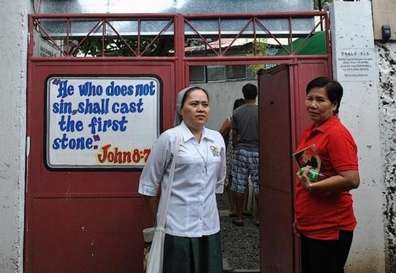Sr Zenaida: To bring the “Table of brotherhood” into prisons
 She has dedicated more than 20 years of her life to prisoners.
She has dedicated more than 20 years of her life to prisoners.Something has changed in the Philippines since the arrival of Ferdinand Marcos Jr as president, “But we can’t say yet if the situation is improving; it’s too early and we don’t know his political agenda,” said Sister Zenaida Cabrera, of the Congregation of the Servants of the Holy Eucharist (SHE), coordinator of Caritas’s programme of assistance to prisoners.
“Our Caritas Ministry of Restorative Justice is directly linked to government agencies because the people we help are in correctional institutions, so we work with the police, the Bureau of Corrections and the Bureau of Jail Management and Penology (BJMP).”
According to a 2019 Amnesty International report, at least 215,000 people are in prison in the Philippines, with a ratio of 200 people incarcerated per 100,000 inhabitants.
“Before the pandemic, before Covid, we were visiting inmates at least once a week, preparing them to reintegrate into society once their sentences had been served. Then came COVID-19 and the sisters and volunteers had to halt their work, which in some facilities has not yet resumed. We cannot penetrate into the maximum-security compounds, but we’re going back to other compounds. In December, for example, Caritas was able to offer food support in medium and low-security prisons. ”Sr Sister Zenaida points outs.
The project “Table of brotherhood” is a recurring theme to which Sister Zeny comes back to in order to describe her work with prisoners.
This work was made possible thanks to the support of the Archdiocese of Manila and the individual parishes with whom the Servants of the Holy Eucharist work. The Sisters are based in the Diocese of Novaliches and are active in various detention centres.
“Our charism is to prepare the Lord’s table for prisoners according to the culture of ‘Salu Salo’, the Philippine tradition of spending time together at the table with friends and family”, adds the Sister.
“We want to give them a second chance to return to life as a reflection of God. Our vocation is to educate them by making them understand that they too are human beings worthy of love and we hope that they can return to their family and their community as children of God.”
“The detainees feel they are far from their natural environment and have no material and moral support,” Sister Zeny explains. “They experience humiliation and rejection from families and are worried about the future of their family members. Detention brings sadness, illness or death.”
Caritas’s programmes of restorative justice are based on the three Rs: recover, rehabilitate and reintegrate.
“Assistance to prisoners is often not part of government budgets, so prisoners rely on the charity of volunteers and their own families, but in most cases, they are very poor. This is why the help of parishes and volunteers is fundamental.”
(Alessandra De Poli/AN)